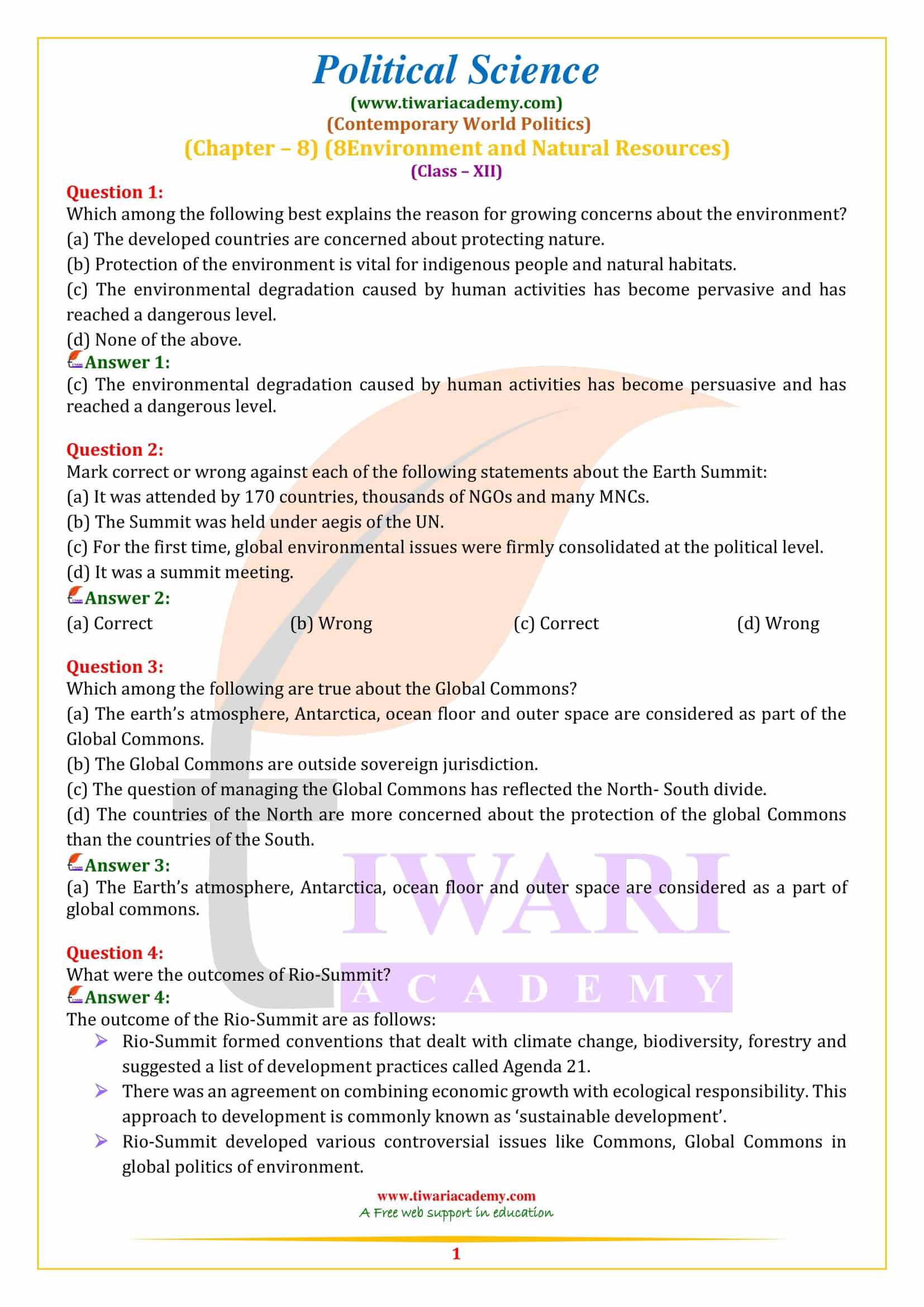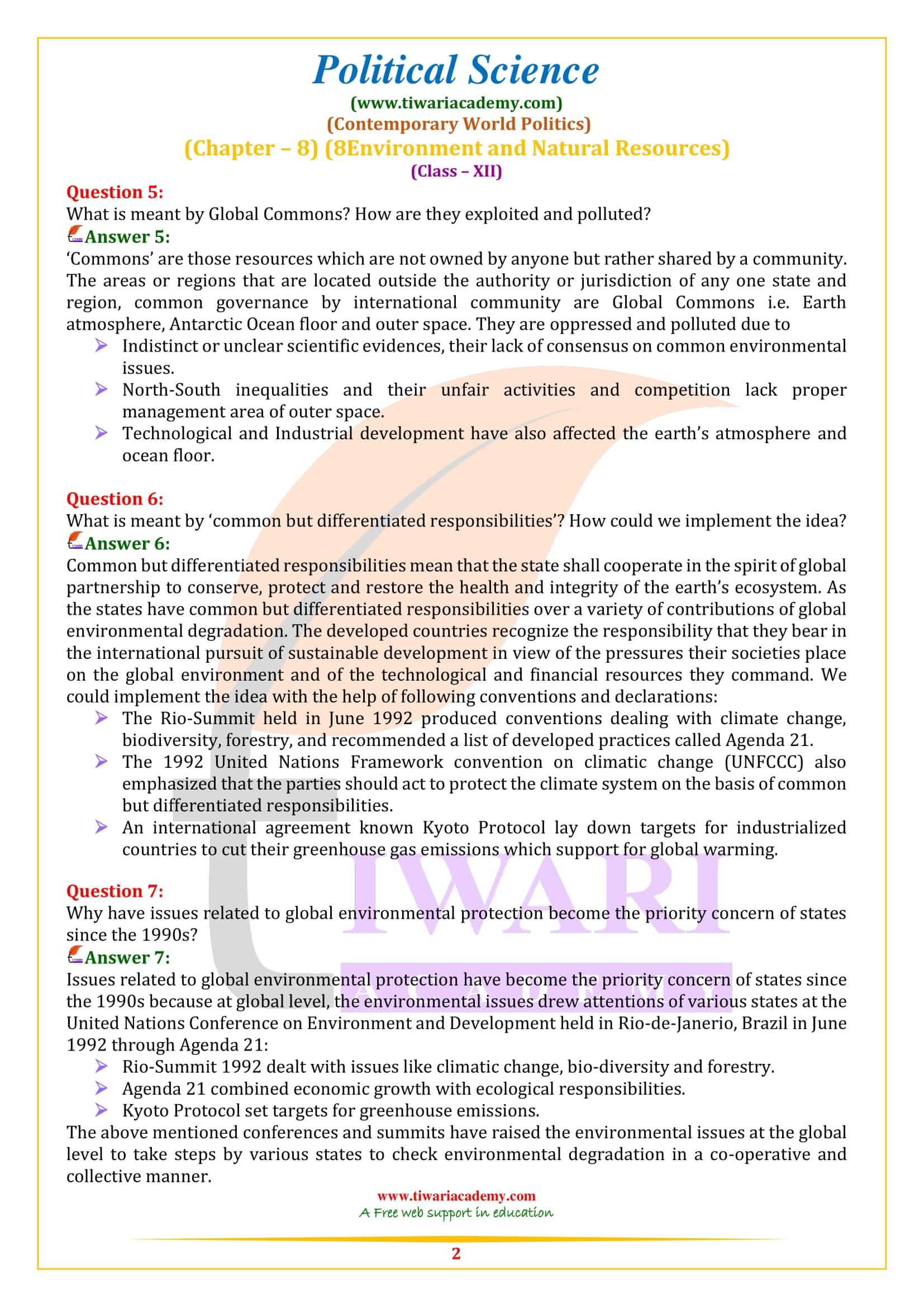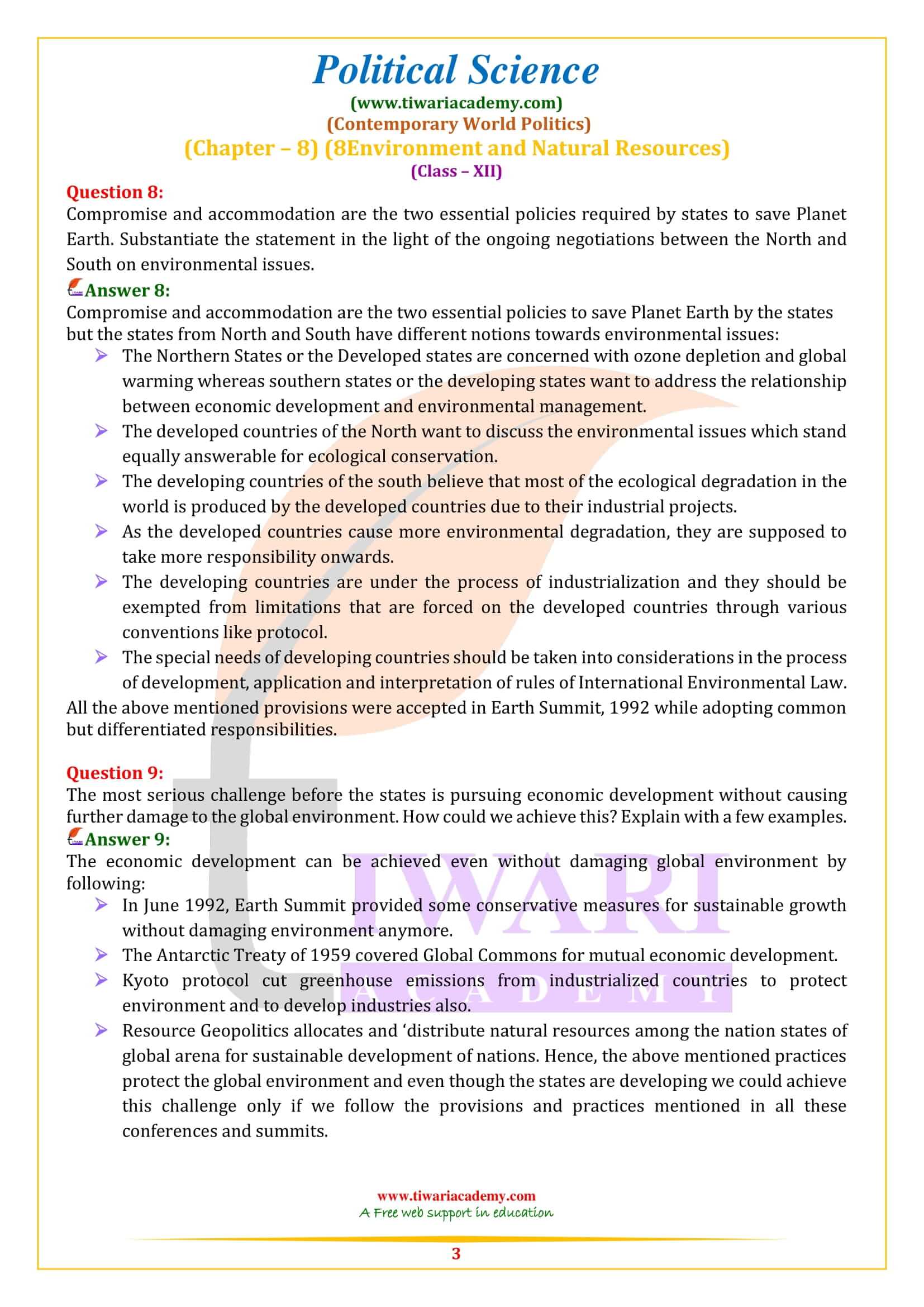NCERT Solutions for Class 12 Political Science Chapter 8 Environment and Natural Resources designed and prepared for CBSE session 2025-26. Students of all boards can get Class 12 Political Science Part 1 Contemporary World Politics chapter 8 solutions in English Medium or Hindi Medium with video solutions.
NCERT Solutions for Class 12 Political Science Chapter 8
Class 12 Political Science Chapter 8 Environment and Natural Resources
Class 12 Political Science Chapter 8 MCQ
Which among the following best explains the reason for growing concerns about the environment?
Which of the following statements about the Earth Summit is correct
Which among the following are true about the Global Commons?
What were the outcomes of Rio-Summit?
The outcome of the Rio-Summit are as follows:
- Rio-Summit formed conventions that dealt with climate change, biodiversity, forestry and suggested a list of development practices called Agenda 21.
- There was an agreement on combining economic growth with ecological responsibility. This approach to development is commonly known as ‘sustainable development’.
- Rio-Summit developed various controversial issues like Commons, Global Commons in global politics of environment.
What is meant by Global Commons? How are they exploited and polluted?
Commons are those resources which are not owned by anyone but rather shared by a community. The areas or regions that are located outside the authority or jurisdiction of any one state and region, common governance by international community are Global Commons i.e. Earth atmosphere, Antarctic Ocean floor and outer space. They are oppressed and polluted due to
- Indistinct or unclear scientific evidences, their lack of consensus on common environmental issues.
- North-South inequalities and their unfair activities and competition lack proper management area of outer space.
- Technological and Industrial development have also affected the earth’s atmosphere and ocean floor.
What is meant by ‘common but differentiated responsibilities’? How could we implement the idea?
Common but differentiated responsibilities mean that the state shall cooperate in the spirit of global partnership to conserve, protect and restore the health and integrity of the earth’s ecosystem. As the states have common but differentiated responsibilities over a variety of contributions of global environmental degradation. The developed countries recognize the responsibility that they bear in the international pursuit of sustainable development in view of the pressures their societies place on the global environment and of the technological and financial resources they command. We could implement the idea with the help of following conventions and declarations:
- The Rio-Summit held in June 1992 produced conventions dealing with climate change, biodiversity, forestry, and recommended a list of developed practices called Agenda 21.
- The 1992 United Nations Framework convention on climatic change (UNFCCC) also emphasized that the parties should act to protect the climate system on the basis of common but differentiated responsibilities.
- An international agreement known Kyoto Protocol lay down targets for industrialized countries to cut their greenhouse gas emissions which support for global warming.
Why have issues related to global environmental protection become the priority concern of states since the 1990s?
Issues related to global environmental protection have become the priority concern of states since the 1990s because at global level, the environmental issues drew attentions of various states at the United Nations Conference on Environment and Development held in Rio-de-Janerio, Brazil in June 1992 through Agenda 21:
- Rio-Summit 1992 dealt with issues like climatic change, bio-diversity and forestry.
- Agenda 21 combined economic growth with ecological responsibilities.
- Kyoto Protocol set targets for greenhouse emissions.
The above mentioned conferences and summits have raised the environmental issues at the global level to take steps by various states to check environmental degradation in a co-operative and collective manner.
Compromise and accommodation are the two essential policies required by states to save Planet Earth. Substantiate the statement in the light of the ongoing negotiations between the North and South on environmental issues.
Compromise and accommodation are the two essential policies to save Planet Earth by the states but the states from North and South have different notions towards environmental issues:
- The Northern States or the Developed states are concerned with ozone depletion and global warming whereas southern states or the developing states want to address the relationship between economic development and environmental management.
- The developed countries of the North want to discuss the environmental issues which stand equally answerable for ecological conservation.
- The developing countries of the south believe that most of the ecological degradation in the world is produced by the developed countries due to their industrial projects.
- As the developed countries cause more environmental degradation, they are supposed to take more responsibility onwards.
- The developing countries are under the process of industrialization and they should be exempted from limitations that are forced on the developed countries through various conventions like protocol.
- The special needs of developing countries should be taken into considerations in the process of development, application and interpretation of rules of International Environmental Law.
All the above mentioned provisions were accepted in Earth Summit, 1992 while adopting common but differentiated responsibilities.
The most serious challenge before the states is pursuing economic development without causing further damage to the global environment. How could we achieve this? Explain with a few examples.
The economic development can be achieved even without damaging global environment by following:
- In June 1992, Earth Summit provided some conservative measures for sustainable growth without damaging environment anymore.
- The Antarctic Treaty of 1959 covered Global Commons for mutual economic development.
- Kyoto protocol cut greenhouse emissions from industrialized countries to protect environment and to develop industries also.
- Resource Geopolitics allocates and ‘distribute natural resources among the nation states of global arena for sustainable development of nations.
Hence, the above mentioned practices protect the global environment and even though the states are developing we could achieve this challenge only if we follow the provisions and practices mentioned in all these conferences and summits.




